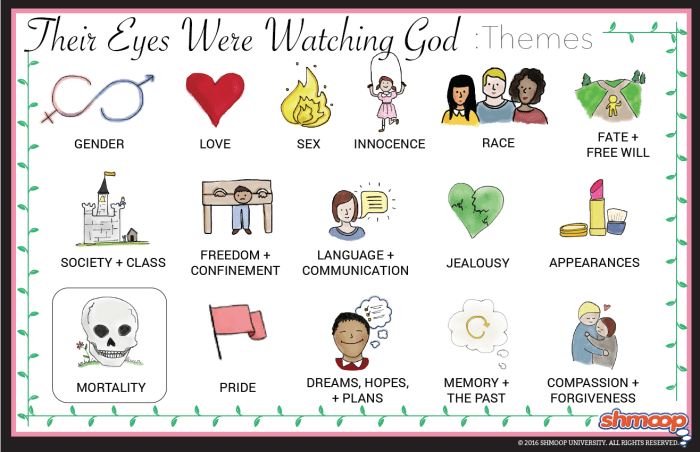Colorism in Their Eyes Were Watching God, a novel by Zora Neale Hurston, delves into the insidious nature of colorism and its profound impact on individuals and society. Through the lens of Janie Crawford’s journey, the novel unveils the intricate interplay between race, gender, and colorism, shedding light on its pervasive effects on identity formation and human relationships.
Hurston’s masterful storytelling transports readers to a world where skin color dictates social status and self-worth, exposing the deep-rooted prejudices that perpetuate a cycle of oppression and inequality. Colorism in Their Eyes Were Watching God is a timeless and thought-provoking work that continues to resonate with readers today, prompting us to confront the enduring legacy of colorism and its far-reaching consequences.
Definition of Colorism
Colorism refers to the discrimination based on skin color within a racial or ethnic group. In “Their Eyes Were Watching God,” colorism manifests within the African American community, where darker-skinned individuals are often subjected to prejudice and discrimination. This discrimination has roots in historical and societal contexts, such as slavery and the internalization of white supremacist ideals.
Manifestations of Colorism

Within the novel, colorism is evident in various interactions and relationships. Janie Crawford, the protagonist, faces prejudice due to her dark skin. She is often excluded from social circles and perceived as less desirable than her lighter-skinned peers. Colorism also influences self-perceptions, as characters internalize societal biases and develop negative feelings towards their own skin color.
For instance, Janie initially desires to lighten her skin, reflecting the internalization of colorist standards.
Impact of Colorism on Characters

Colorism profoundly impacts Janie’s and other characters’ psychological and emotional well-being. Janie struggles with self-esteem issues and experiences feelings of inadequacy due to her dark skin. Colorism perpetuates a cycle of oppression and inequality, as darker-skinned individuals face limited opportunities and diminished social status.
The novel explores the psychological and emotional toll of colorism, highlighting its damaging effects on individuals and the community.
Resistance to Colorism
Despite the prevalence of colorism, the novel also portrays instances of resistance and defiance. Janie challenges colorist norms through her relationships and self-acceptance. She defies societal expectations by marrying Tea Cake, a darker-skinned man, and embraces her own identity. Other characters, such as Phoeby, also challenge colorist biases by valuing individuals based on their character rather than their skin color.
These acts of resistance serve as a testament to the resilience and determination of those who face colorism.
Colorism and Identity Formation: Colorism In Their Eyes Were Watching God

Colorism shapes Janie’s and other characters’ identities in complex ways. Janie’s journey of self-discovery is intertwined with her experiences with colorism. As she navigates different relationships and societal pressures, she gradually develops a stronger sense of self and challenges the limitations imposed by colorist norms.
The novel explores the interplay between race, gender, and colorism, highlighting the multifaceted nature of identity formation within a society that perpetuates colorist biases.
Popular Questions
What is colorism?
Colorism refers to the prejudice or discrimination against individuals based on the darkness or lightness of their skin tone, often within the same racial group.
How does colorism manifest in Their Eyes Were Watching God?
Colorism is evident in the novel through characters’ interactions, relationships, and self-perceptions. Lighter-skinned characters are often favored and treated with greater respect, while darker-skinned characters face prejudice and discrimination.
What are the psychological and emotional effects of colorism?
Colorism can lead to feelings of inferiority, low self-esteem, and internalized racism among darker-skinned individuals. It can also perpetuate a cycle of oppression and inequality.
